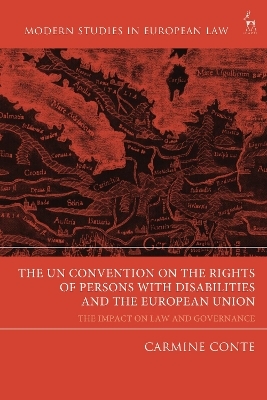
The UN Convention on the Rights of Persons with Disabilities and the European Union
Hart Publishing (Verlag)
978-1-5099-4518-4 (ISBN)
This book brings together the practices of the European Court of Justice (CJEU) with regard to disability discrimination to show whether the CRPD is living up to its full potential to substantially improve the protection of the rights of persons with disabilities in the EU. It examines whether the judicial interpretation of the Directive 2000/78/EC, establishing a general framework for equal treatment in employment and occupation, does or does not comply with the new legal background delineated by the CRPD. In addition, it investigates whether the governance mechanisms underlying the EU Framework for promoting, protecting and monitoring the CRPD are effectively fostering the implementation of the CRPD and the role of civil society.
The prohibition of discrimination on grounds of disability has undergone substantial changes and developments since it was first introduced under international and EU law. This book highlights the main changes to disability discrimination which have occurred in the EU legal order in the last ten years. The book will be of interest to academics, law students and legal practitioners working in the field of EU non-discrimination and equality law.
Carmine Conte is legal policy analyst at the Migration Policy Group, Brussels, Belgium.
1. Introducing the CRPD: A New Approach to Equality and Non-Discrimination?
I. Introductory Remarks
II. Equality and Non-Discrimination: A New Approach for Disability Rights
III. The Complex and Intriguing Evolution of the Right to Equality in International Law
A. The Controversial ‘Sameness’ Model
B. Embracing the Symmetrical Approach at International Level
C. Is the Formal Approach Adequate to Combat Discrimination?
D. Beyond Differences: Time to Recognise Social Barriers and Positive Duties
E. The Prohibition of Discrimination under the CRPD: A New Inclusive Model
F. Defining the Concept of Multiple and Intersectional Discrimination
IV. The CRPD’s Model of Disability: From a Social Construct Towards a Human Rights Approach
V. Reconceptualising the Human Rights Dichotomy
A. Disability Rights are Universal and Indivisible: Do Civil and Political Rights also Demand Economic Resources?
B. Disability Rights as (Quasi)-Justiciable Rights
2. The New Role for Civil Society under the CRPD
I. The Rise of Civil Society in Global Governance
A. Participatory Democracy and Global Governance
B. Opening Up the Decision-Making Process
C. Ensuring Transparent Procedures
II. Mainstreaming Disability in the International Agenda
A. ‘Nothing about us without us’: A Commitment to Participatory Democracy
III. Civil Society’s Role in Implementing the CRPD at National Level
A. Institutionalising Civil Society
B. Awareness-Raising: A Synergetic Action between States Parties and NGOs
IV. Participatory Democracy in the EU: From the White Paper to the Lisbon Treaty
A. The Inclusive Process of the EUCFR’s Adoption: The ‘Convention’ Method
B. How to Improve EU Participatory Democracy? The Good Practice of the CRPD
3. Ten Years aft er EU Accession to the CRPD: From Theory to Reality
I. An Overview of the Prohibition of Discrimination under EU Law
A. The EU Charter of Fundamental Rights
B. The Convention for the Protection of Human Rights and Fundamental Freedoms
II. Disability Rights in the EU
III. The EU Anti-Discrimination Framework: Directive 2000/78/EC
A. Exploring the Meaning of Direct Discrimination
B. Introducing the Concept of Indirect Discrimination
C. Reasonable Accommodation: The Paramount Obligation
IV. Filling in the Gap: The Evolving Concept of Disability
A. The EU Approach to Disability
B. An Intriguing Evolution: The Case of Ring and Skouboe Werge
C. Obesity and Disability: The Case of Kaltoft v Municipality of Billund
D. The Case of Daouidi: Clarifying the Long-Term Nature of the Impairment
E. Absence from Work on Grounds of Sickness: The Case of Ruiz Conejero
F. Defining Disability beyond the Labour Market: The Case of Glatzel
G. Is the CJEU Still a Real Promoter of Disability Rights?
4. The EU Legal Framework: Associative and Intersectional Discrimination
I. Discrimination by Association on Grounds of Disability
A. The Coleman Case: Factual Background
B. The Advocate General’s Opinion
C. Analysis of the Judgment: Who Falls under the Protection of Discrimination by Association?
D. The Controversial Nature of Reasonable Accommodation
E. Concluding Remarks: A Shift Towards Substantive Equality
II. Why Does Multiple and Intersectional Discrimination Matter?
III. The Odar Case: Disability and Age Discrimination
IV. Surjit Singh Bedi v Bundesrepublik Deutschland: Collective Agreement and Intersectional Discrimination
V. The Case of Z v A Government Department: Gender and Disability
A. The Court’s Findings
B. How to Deal with Multiple and Intersectional Discrimination under EU Law
C. The Failure to Apply the Human Rights Model of Disability
D. The Complex Interplay between International Law and EU Law
E. The Incongruous CJEU Reasoning: Time for a Change
5. EU Governance and the Framework for Monitoring the CRPD
I. Ratifying and Implementing the UN Convention: Winners and Losers in the EU Institutional Game
II. The Negotiations of the CRPD and the EU
A. The Commission’s Contribution to the Drafting of the CRPD
B. Ensuring Coordination between Various EU Actors
C. The Commission and the Union’s External Policy Representation
III. Monitoring the CRPD’s Implementation: New Governance Mechanisms
A. The Experimentalist Paradigm
B. The Open Method of Coordination (OMC)
C. The Focal Point
D. Coordination Mechanism between the EU and the Member States
IV. The EU Framework for Promoting, Protecting and Monitoring the CRPD
A. The Commission’s Experimentalist Approach
B. The European Parliament and the Protection of Disability Rights
C. The European Ombudsman
D. The Monitoring Role of the EU Agency for Fundamental Rights
E. The EDF’s Challenge to Open Up the EU Decision-Making Process
F. Focal Point and Coordination Mechanism: Innovative or Inefficient Practices?
V. Light and Shadow in the EU Independent Framework
A. The Commission’s Withdrawal from the Framework: What Next?
B. Is the European Parliament Marginalised?
C. Is the OMC Appropriate?
6. Conclusion: Time to Unleash the CRPD’s Full Potential
I. The EU Legal Framework: Main Findings
A. The Definition of Disability: A Missed Opportunity
B. The Legal Gaps in Addressing Multiple and Intersectional Discrimination
C. Indirect Discrimination and Reasonable Accommodation: Towards a Better Judicial Interpretation?
D. The Inclusive Equality Paradigm under the CRPD
E. The Complicated Relationship between the CRPD and the EU Legal System
F. Key Recommendations for Improving the Interpretation of EU Equality Norms
II. EU Governance: Main Findings
A. The Importance of Reforming the EU Independent Framework
B. Key Recommendations for Improving EU Governance Mechanisms
C. Good Governance and Participatory Democracy: The CPRD’s Positive Practice
III. Time to Unleash the CRPD’s Full Potential
| Erscheinungsdatum | 17.02.2022 |
|---|---|
| Reihe/Serie | Modern Studies in European Law |
| Verlagsort | Oxford |
| Sprache | englisch |
| Maße | 156 x 234 mm |
| Themenwelt | Recht / Steuern ► Arbeits- / Sozialrecht ► Sozialrecht |
| Recht / Steuern ► EU / Internationales Recht | |
| Recht / Steuern ► Öffentliches Recht | |
| Sozialwissenschaften ► Soziologie | |
| ISBN-10 | 1-5099-4518-0 / 1509945180 |
| ISBN-13 | 978-1-5099-4518-4 / 9781509945184 |
| Zustand | Neuware |
| Informationen gemäß Produktsicherheitsverordnung (GPSR) | |
| Haben Sie eine Frage zum Produkt? |
aus dem Bereich


